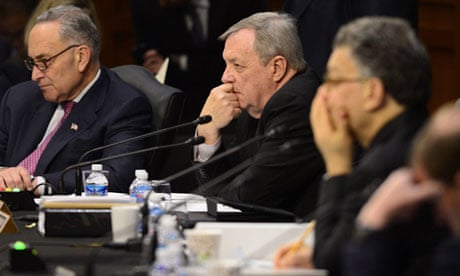The scale of the revolution in Republican thinking required to pass comprehensive immigration reform was laid bare in a bumpy first day of debate of a supposedly bipartisan bill in the Senate.
All six Republicans on the judiciary committee who are not directly sponsoring the bill voted in favour of amendments on Thursday that would significantly delay legalising 11 million undocumented migrants in the US.
Conservatives such as Texan Ted Cruz clashed with the committee's Democrat majority, who accused them of trying to scupper reform entirely.
Immigration experts anticipate that anxiety among Republicans will only intensify as momentum passes to the more conservative House of Represenatives, but predict electoral self-interest among the leadership may yet carry it through.
"It is a delicate dance," said Ted Alden of the Council on Foreign Relations. "When you move through to the House there are a higher percentage in the Cruz camp, but you don't need a majority of the Republicans to do this if the leadership is looking to let it through."
Following their defeat in the 2012 election, Republican leaders concluded they needed to back immigration reform to win over the growing number of Latino voters who secured President Obama's second term. Senior figures with presidential ambitions in 2016 such as congressman Paul Ryan, and senators Rand Paul and Marco Rubio, have already spoken out in favour of the bill.
Alden said House speaker John Boehner was "playing his cards closer to his chest" but predicted he would be willing to let the bill pass with a minority of Republicans voting alongside Democrats if presidential hopefuls kept up their pressure.
During the debate on Thursday, a number of Republicans attempted to delay the implementation of an amnesty-like provision until authorities could prove they had fully secured the southern border with Mexico against further illegal entry.
Though defeated by Democrats, who form a majority on the Senate judiciary committee, the Republicans warned the issue would become a sticking point in the House of Representatives. "If we don't have real border security, in my view this bill will not pass," said Cruz.
This prompted an angry response from the bill's sponsors who accused opponents of using border security as an excuse to block any immigration reform.
"The real reason [he wants this] is: Senator Cruz is opposed to a path to citizenship," said New York Democrat Chuck Schumer. "Let's not keep bringing up this false issue of border security. Our bill is tough as nails on border security, but what it does not do is deny 11 million people a path to citizenship."
Committee chairman Patrick Leahy later attempted to paper over the cracks in the consensus, pointing out that the committee had adopted 21 of the 32 amendments offered on Thursday – almost all with some degree of bipartisan agreement – but battle lines have been drawn.
Earlier, a third of the members of the judiciary committee voted for two amendments that would delay US immigration reform at its first hurdle, suggesting the bill may face a bumpier ride through Congress than its bipartisan backers had hoped.
The first amendment, proposed by the Iowa Republican Chuck Grassley, would have required the government to show it had "fully secured" the border with Mexico for six months before allowing the estimated 11 million undocumented migrants who are already in the US to begin applying for legal status. Currently, the bill proposes allowing the process to begin as long as the government comes up with a plan to tighten border security further.
Though defeated, the attempt to delay the process was supported by five other Republicans on the judiciary committee, which is considering amendments in the first stage of a legislative process that is likely to last until at least July. Only Lindsey Graham of South Carolina and Arizona's Jeff Flake, both members of the "gang of eight" who proposed the bill last month, voted against their fellow Republicans.
Although a Democrat majority on the Senate committee ensures the mark-p process should proceed without any major opposition measure passing, the initial session on Thursday undermined suggestions that there is broad bipartisan support for the immigration reform bill. Some among the gang of eight had hoped for a majority of at least 70 in the full Senate as a show of strength that would give the bill momentum to pass through the Republican-controlled House.
Grassley said: "The bill will struggle to pass the House unless the border security problem is fixed."
He argued that US public opinion was against anything that would add millions of new legal competitors for jobs without first guaranteeing that no more illegal immigrants would arrive.
The committee debate also heard colourful language from the Texas Republican John Cornyn, who said there were also national security concerns – as some of those coming across the Mexican border were "wearing turbans".
Graham suggested that many of those crossing from Mexico and other countries were doing so because where they came from was a "hell hole".
Schumer, one of the key backers of reform, warned that any amendment requiring full border security compliance could fatally undermine the legislation. "It would mean if one radar is broken then nobody who is already here could get legal status," he said. "It would probably delay for ever anything to bring these people out of the shadows."
Another Grassley amendment, proposing that Congress rather than the government should determine whether border security was adequate before implementing the bill, saw a similar six v 12 rebellion from Republicans.

Comments (…)
Sign in or create your Guardian account to join the discussion